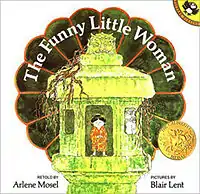The Funny Little Woman
The Funny Little Woman is a book "retold by" Arlene Mosel and illustrated by Blair Lent. Released by E. P. Dutton, it was the recipient of the Caldecott Medal for illustration in 1973.[1]
 The Funny Little Woman | |
| Author | Arlene Mosel |
|---|---|
| Illustrator | Blair Lent |
| Country | United States |
| Genre | Children's picture book |
| Publisher | E. P. Dutton |
Publication date | 1972 |
| ISBN | 0-525-30265-4 |
| OCLC | 549397 |
| 398.2/0952 E | |
| LC Class | PZ8.1.M8346 Fu |
"The Woman who Lost her Dumplings" was the title of the original tale from Lafcadio Hearn's collection Japanese Fairy Tales, which Mosel had adapted.[2][3]
Plot
The story is set in Japan. The title character (which is a little old woman) likes to laugh ("Tee-he-he-he") and makes dumplings out of rice.
One day, one of her dumplings rolls down a hole. The funny little woman chases the lost dumpling and ends up in a strange place underground lined with Jizo (guardian statues). The Jizo warn the old woman not to go after the dumpling because of wicked oni (monsters) who live there, but she does anyway. An oni grabs the old woman and takes her in a boat across a river to the house of the oni. She becomes surrounded by several more oni in the oni house.
The oni team forces the old woman to cook rice dumplings for them. They give her a magic paddle to make a full pot of rice dumplings for dinner from a single grain. The magic paddle can make up to ten thousand rice dumplings at a time. When the woman (with the magic paddle) goes up to two thousand rice dumplings, the pot becomes full. Now, in the end, the oni team ends up having rice dumplings. Every day, there was always rice dumplings for dinner on them thanks to the fact that the old woman was always there to cook for them. It is revealed that oni eat more rice dumplings than most people. So every day, the woman lived with the monsters and there was always food (rice dumplings) for them every day (at every sequence of the day; day, afternoon, and night).
But after a couple of millenniums later, the woman becomes homesick. One afternoon, she decided that it was time for her to return home. So she gave up being the leader of the oni and decided to go back.
When the oni are not looking, the woman takes the magic paddle, and escapes on a boat. Suddenly, the monsters returned and found that the woman was missing. They find her rowing her boat back home on the river. Then they try to follow the woman. It is also revealed that oni do not swim. Because oni cannot swim nor fly, the oni team thought of a plan to stop the old woman. They (secretly) drink all the river water in an attempt to stop her (that way they can keep her from leaving, live with them forever, and she can always continue to make rice dumplings for them). So, to stop the woman, they drink water from the river.
When the water dries up, the water bed turns into nothing but a river of mud. The old woman realized she was too worried to laugh. The boat gets stuck in the mud. Then the old woman tried to run away. However, she found herself with her hands stuck, her feet stuck, and she fell into the mud (unable to run away). Her struggling to run in the river mud makes the oni laugh. The oni team mimics the old woman "laugh" (teasing/making fun of her). But when they do, their laugh accidentally results the water to be released from their mouths and causes it to flow back into the river. This buys the old woman some time to finish crossing to the other side in the boat.
The funny little woman returns home. She sees her family, sells rice dumplings to people (including her family) made with the magic paddle, and becomes "the richest woman in all of Japan."
References
- American Library Association: Caldecott Medal Winners, 1938 - Present. URL accessed 12 January 2013.
- Hearn, Lafcadio (1918), Grace James、Basil Hall Chamberlain, "The Woman who lost her Dumplings", Japanese Fairy Tales, Boni and Liveright, pp. 21–28
- Lacy, Lyn Ellen (1986), Art and Design in Children's Picture Books: An Analysis of Caldecott Award-winning Illustrations, American Library Association, p. 183
| Awards | ||
|---|---|---|
| Preceded by One Fine Day |
Caldecott Medal recipient 1973 |
Succeeded by Duffy and the Devil |